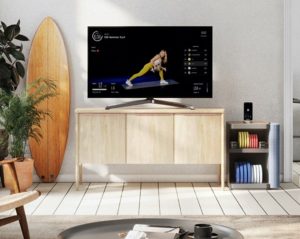
The smart home gym creator is offering a lower-cost and compact gym.
As the health and wellness industry grows substantially, some companies struggle to offer inclusive price points, narrowing the consumer base. Tempo, a smart home gym, has made a decisive move – offering a two-foot-tall $395 system called Tempo Move. Will Tempo’s decision become the trend for fitness companies in 2022 and beyond?
Offering a premium product at a reduced cost is a business decision that may have significant benefits, and it could be one strategic path that may be best to forge before troubles arise, as seen with Peloton.
Shares of Peloton recently fell 25% after the fitness company reported declining sales and a higher-than-expected loss in its first quarter. Peloton announced it would revise its future expectations but also has plans to attract a more cost-conscious crowd.
Reducing higher price points can make a highly-coveted fitness product more attainable, resulting in a more extensive potential customer base who are eager to work out without breaking the bank.
The new Tempo Move smart home gym is priced considerably less than its original Tempo Studio, $2,495.
The scaled-down (in space and price) Tempo Move includes weight plates and connects to the user’s TV and iPhone, guiding the user through fitness workouts. It connects to live and on-demand classes via a monthly subscription. Tempo utilizes 3D sensors and AI, detecting movement and provides rep-counting, form feedback, and offers weight recommendations for the user. Tempo says that the system will soon support dumbbells, barbells, and kettlebells.
The small footprint of Tempo Move makes it appealing to fitness users who prefer to work out at home or will transition to a hybrid-fitness model. Designed to be compact and fit anywhere, the Tempo Move is a piece of fitness equipment that can easily integrate into any space.
This year, Tempo announced that it raised $220 million in new funding through a Series C round, led by SoftBank Vision Fund 2, bringing the smart home gym’s funding to almost $300 million. Tempo had plans to use the funding to enhance its AI and 3D sensor technology, expand content offerings, and cultivate a personal trainer experience.
Co-founder and CEO of Tempo, Moawai Eldeeb, had said that the company gained “significant momentum” since its launch in 2020. Sales increased by ten times, and the company reported a subscription cancellation stat of 0%. The company, Eldeeb says, was launched on the premise of the most advanced and versatile technology, unlocking human potential.
Investors saw Tempo as properly-positioned to thrive, as at-home fitness was becoming prevalent due to the pandemic. With gyms closed, fitness became centered around the home and the need for gym equipment increased.
“The fitness landscape has transformed dramatically as more consumers seek home fitness solutions. By providing personalized AI-generated feedback through its computer vision technology, Tempo delivers the experience of working out with a personal trainer to consumers in their homes,” said Jeff Housenbold, Managing Partner of SoftBank Investment Advisers, in a press release.
Tempo Move may see a continued increase in sales, as people move towards embracing a hybrid-model of fitness. The at-home smart gym can be purchased on Tempo’s website or Best Buy.
